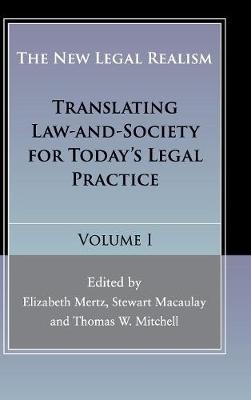
The New Legal Realism: Volume 1
Cambridge University Press (Verlag)
978-1-107-07113-1 (ISBN)
This is the first of two volumes announcing the emergence of the new legal realism as a field of study. At a time when the legal academy is turning to social science for new approaches, these volumes chart a new course for interdisciplinary research by synthesizing law on the ground, empirical research, and theory. Volume 1 lays the groundwork for this novel and comprehensive approach with an innovative mix of theoretical, historical, pedagogical, and empirical perspectives. Their empirical work covers such wide-ranging topics as the financial crisis, intellectual property battles, the legal disenfranchisement of African-American landowners, and gender and racial prejudice on law school faculties. The methodological blueprint offered here will be essential for anyone interested in the future of law-and-society.
Elizabeth Mertz is John and Rylla Bosshard Professor of Law at the University of Wisconsin Law School and Research Faculty at the American Bar Foundation. She is the author of The Language of Law School: Learning to 'Think Like a Lawyer' (2007), co-winner of the Herbert Jacob Prize of the Law and Society Association. Stewart Macaulay is an internationally recognized leader of the law-in-action approach to contracts and a founder of the modern law-and-society movement. He is the author of Law and the Balance of Power: The Automobile Manufacturers and their Dealers (1966) and Law in Action: A Socio-Legal Reader (2007, with Lawrence Friedman and Elizabeth Mertz). Thomas W. Mitchell is a professor at Texas A&M University, where he holds a joint appointment in the School of Law and in the Agricultural Economics Department. His research and policy work address property issues within disadvantaged communities. He served as the principal drafter of the Uniform Partition of Heirs Property Act, a uniform act designed to strengthen property rights for disadvantaged common property owners, which several states have enacted into law.
Preface Michael McCann; 1. Introduction: new legal realism: law and social science in the new millennium Elizabeth Mertz; Part I. The Place of New Legal Realism in Legal Thought and Teaching: 2. A new legal realism: elegant models and the messy law in action Stewart Macaulay; 3. Putting the 'real world' into traditional classroom teaching Jane H. Aiken and Ann Shalleck; 4. Some realism about realism in teaching about the legal profession Ann Southworth, Bryant Garth and Catherine Fisk; 5. 'Fielding' legal realism: law students as participant-observers? Riaz Tejani; Part II. Philosophy and Methods for a New Legal Realism: 6. Legal R/realism and jurisprudence: ten theses William Twining; 7. Legal realism in context Brian Z. Tamanaha; 8. Legal storytelling as a variety of legal realism Robert W. Gordon; 9. Combining methods for a new synthesis in law and empirical research Elizabeth Mertz and Katherine Barnes; Part III. New Legal Realist Translations: 10. New legal realism and inequality Thomas W. Mitchell; 11. The financial crisis and moral accountability: translating practices of risk, profit, and uncertainty Alex Tham; 12. The moment of possibles: some new legal realism about a 'reality thriller' case Hadi Nicholas Deeb; 13. Translating law across cultures and societies: a conversation with David Bellos and Kim Lane Scheppele David Bellos and Kim Lane Scheppele; 14. Is there a lingua franca for the American legal academy? Mary Anne Case.
| Erscheint lt. Verlag | 3.5.2016 |
|---|---|
| Zusatzinfo | 1 Tables, black and white; 1 Halftones, black and white; 2 Line drawings, black and white |
| Verlagsort | Cambridge |
| Sprache | englisch |
| Maße | 155 x 235 mm |
| Gewicht | 570 g |
| Themenwelt | Recht / Steuern ► Allgemeines / Lexika |
| Recht / Steuern ► EU / Internationales Recht | |
| Recht / Steuern ► Öffentliches Recht ► Völkerrecht | |
| Sozialwissenschaften ► Soziologie | |
| ISBN-10 | 1-107-07113-5 / 1107071135 |
| ISBN-13 | 978-1-107-07113-1 / 9781107071131 |
| Zustand | Neuware |
| Haben Sie eine Frage zum Produkt? |
aus dem Bereich


